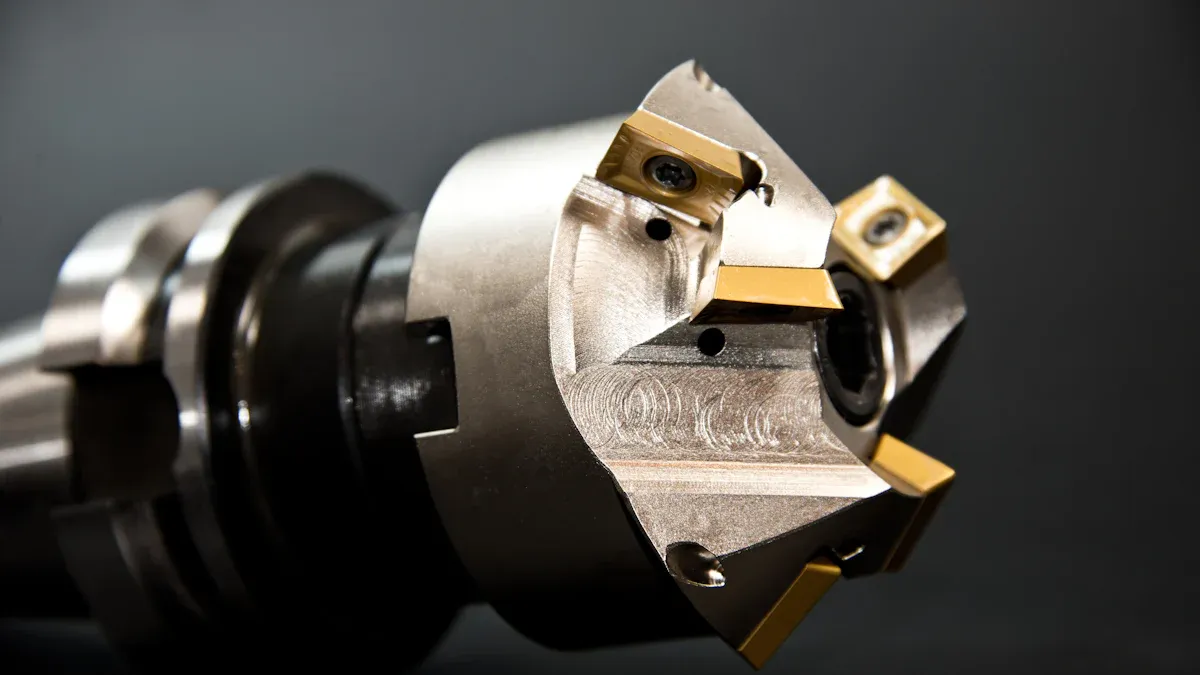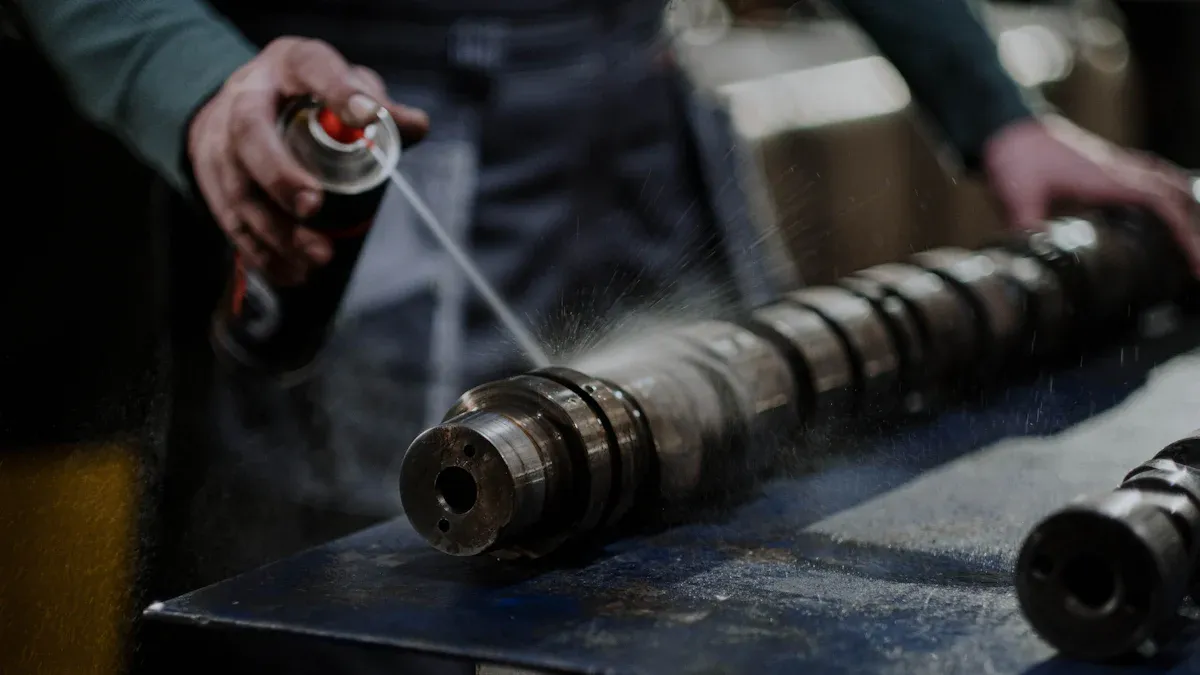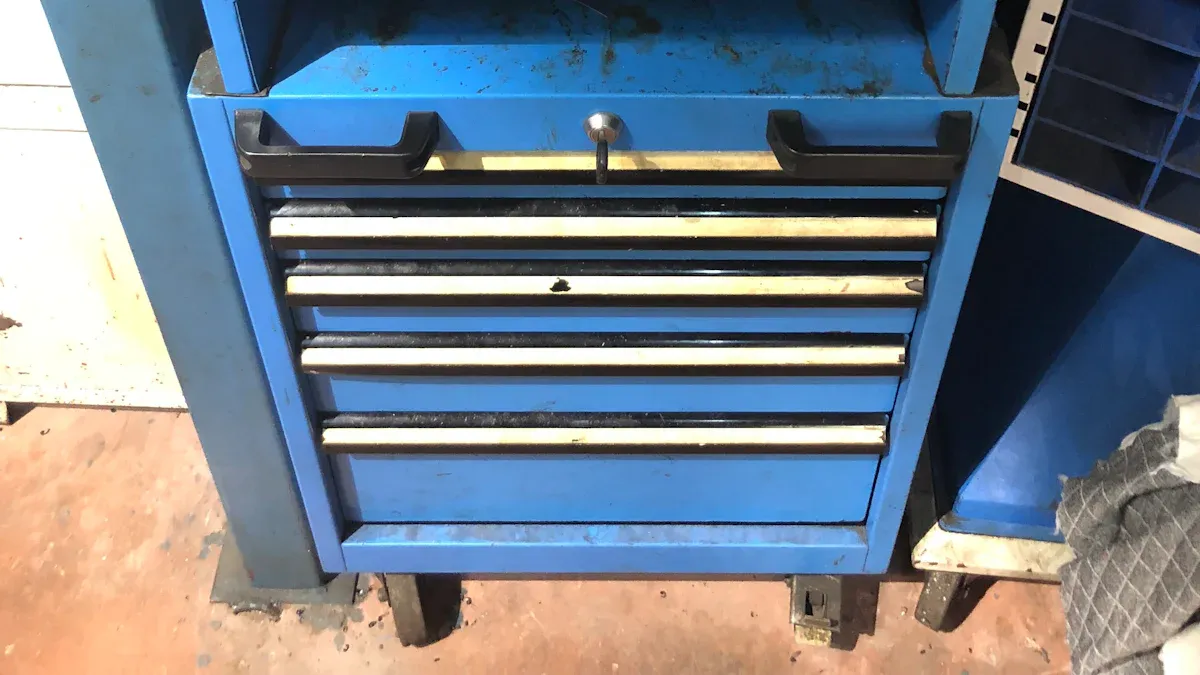
CNC machined metal precision parts play a crucial role in modern manufacturing. Industries rely on these parts for their unmatched accuracy and efficiency. CNC machining ensures consistent quality by automating production and eliminating human error. It produces OEM precision machined metal parts with tight tolerances, reducing waste and energy use. This technology also excels in creating precision castings components, meeting the demands of complex designs.
Aerospace Industry and CNC Machined Metal Precision Parts

Precision and Safety in Aerospace
The aerospace industry demands absolute precision. Even the smallest error can lead to catastrophic consequences. CNC machined metal precision parts play a vital role in ensuring safety by minimizing manufacturing errors. These parts meet strict size and tolerance requirements, which are essential for maintaining performance standards. CNC machining also ensures repeatability, producing identical components every time. This consistency is critical in aerospace, where reliability is non-negotiable.
Manufacturers in this sector often adhere to the AS9100 certification, a quality management system specific to aerospace. This certification ensures that every part meets stringent safety and quality standards. CNC machining’s ability to produce high-precision components with tight tolerances directly contributes to the safety of aircraft and spacecraft. Without this technology, achieving the required level of accuracy would be nearly impossible.
Applications in Aircraft and Spacecraft Components
CNC machined metal precision parts are used in a wide range of aerospace applications. These include:
- Internal structures for vertical and horizontal stabilizers
- Turbine blades and housings
- Engine mounts and pylons
- Seat tracks, support brackets, clamps, and mounts
- Landing gear doors and access panels
The materials used in these components are just as important as the machining process. Aerospace manufacturers often choose materials like aluminum alloys for their strength-to-weight ratio or titanium alloys for their exceptional durability and corrosion resistance. Nickel alloys and stainless steel are common in engine parts due to their ability to withstand extreme temperatures. Composite materials and high-performance plastics are also popular for their lightweight properties.
CNC machining supports rapid prototyping, allowing engineers to test designs quickly. This speed and precision help reduce costs and improve efficiency during production. By enabling the creation of complex, high-quality parts, CNC machining has become indispensable in the aerospace industry.
Medical Industry and CNC Machined Metal Precision Parts
CNC Machining for Surgical Tools and Implants
CNC machined metal precision parts have revolutionized the medical field, especially in the production of surgical tools and implants. These tools require extreme accuracy to ensure patient safety and effective treatment. CNC machining delivers this precision by creating components with tight tolerances and complex geometries. For instance, CNC milling is used to craft intricate parts, while CNC turning is ideal for cylindrical components. Surface finishing techniques, such as electro-polishing, enhance biocompatibility by improving surface quality and removing contaminants.
Commonly manufactured surgical tools include scalpels, forceps, and clamps. Orthopedic implants, like hip and knee replacements, also rely on CNC machining for their precise fit and durability. Dental implants and tools used in oral surgeries are other examples. The ability to work with biocompatible materials, such as titanium and stainless steel, makes CNC machining indispensable in this industry. These materials ensure that implants integrate seamlessly with the human body, reducing the risk of complications.
Benefits for Medical Device Manufacturing
The medical industry demands innovation and reliability, and CNC machining meets these needs effortlessly. It allows manufacturers to achieve micron-level accuracy, which is critical for devices requiring a precise fit. For example, porous implants created through CNC machining aid in bone integration, improving patient outcomes. Additionally, this technology supports the production of customized implants tailored to individual anatomy, enhancing comfort and recovery times.
CNC machining also plays a vital role in advancing medical technology. It produces components for robotic surgery systems, wearable medical devices, and even bioresorbable implants that dissolve in the body over time. These advancements highlight the versatility of CNC machined metal precision parts in meeting the evolving demands of healthcare. By ensuring repeatability and adhering to strict tolerances, CNC machining improves the quality and performance of medical devices, making it a cornerstone of modern medical manufacturing.
Automotive Industry and CNC Machined Metal Precision Parts

High-Precision Components for Vehicle Performance
The automotive industry thrives on precision. Every component in a vehicle must work seamlessly to ensure safety, performance, and efficiency. CNC machined metal precision parts play a pivotal role in achieving this. These parts are crafted with incredible accuracy, meeting the tight tolerances required for modern vehicles. For example, CNC machining produces critical components like valves, pistons, and camshafts. These parts enhance engine performance, improve fuel efficiency, and ensure smooth operation under high-speed conditions.
CNC machining also optimizes the size and shape of components, which boosts power output and reduces fuel consumption. This precision ensures that engines operate reliably and last longer. Additionally, CNC machining supports sustainable manufacturing by minimizing material waste. By aligning production with demand and using resources efficiently, manufacturers reduce costs and their environmental impact. This approach not only benefits the planet but also attracts eco-conscious customers.
Applications in Engine and Transmission Systems
CNC machining is indispensable in creating engine and transmission components. Engine blocks and cylinder heads, for instance, require intricate designs and precise coolant passages to function effectively. Transmission parts like gears and clutches must withstand significant operational stresses, making precision machining essential. Other examples include crankshafts, which need perfect balancing, and splined shafts, which feature intricate profiles for torque transmission.
| Component Type | Description |
|---|---|
| Cylinder Heads and Blocks | Critical engine components requiring complex contours and precise coolant passages. |
| Crankshafts | Must withstand mechanical stresses; CNC machining ensures high precision for balancing. |
| Gears | Require precise tooth profiles for durability and noise reduction in transmissions. |
| Engine Blocks | Backbone of the engine assembly; CNC machining creates intricate designs and precise dimensions. |
By meeting stringent automotive standards, CNC machining ensures that vehicles perform reliably and efficiently. It’s no wonder this technology is a cornerstone of automotive manufacturing.
Electronics Industry and CNC Machined Metal Precision Parts
Miniaturized and Complex Components
The electronics industry thrives on innovation, and CNC machined metal precision parts play a key role in making that possible. Modern electronic devices demand components that are not only small but also incredibly intricate. CNC machining meets these demands by delivering unmatched precision and consistency. It allows manufacturers to create parts with tight tolerances, ensuring every piece functions as intended.
Achieving tight tolerances is crucial as even minor deviations can affect functionality. Material damage is a concern due to the small size of components, which increases the risk of mechanical and thermal damage. Efficient chip evacuation is necessary to prevent tool breakage and ensure a good surface finish.
CNC machining also excels in working with lightweight materials like aluminum, which is ideal for electronic components due to its conductivity and corrosion resistance. This capability ensures that devices remain compact and efficient without compromising performance.
Applications in Consumer Electronics and Circuit Boards
CNC machining has revolutionized the production of consumer electronics and circuit boards. It enables the creation of intricate pathways in printed circuit boards (PCBs), ensuring accurate assembly and functionality. Manufacturers rely on this technology to produce essential components like heat sinks, semiconductors, and casings. These parts are critical for the performance and reliability of devices like smartphones, laptops, and gaming consoles.
- CNC machining allows manufacturers to create complex parts with precision that surpasses manual methods.
- The precision ensures that each component fits perfectly, contributing to the efficiency and reliability of the final product.
- It is adaptable to various materials like fiberglass and copper-clad laminates, meeting specific electrical and thermal properties.
Additionally, CNC machining supports environmentally friendly practices. It reduces material waste, minimizes coolant usage, and even incorporates recycling programs for waste materials. These benefits make it a sustainable choice for the electronics industry.
Oil and Gas Industry and CNC Machined Metal Precision Parts
Durability for Extreme Conditions
The oil and gas industry operates in some of the harshest environments on Earth. Equipment must endure extreme pressures, high temperatures, and exposure to corrosive materials. CNC machined metal precision parts are designed to meet these challenges head-on. They ensure durability and reliability, which are critical for safety and efficiency in this sector.
Materials used in CNC machining for oil and gas equipment are carefully selected for their strength and resistance. Metals like stainless steel and titanium are common due to their ability to withstand corrosion and wear. Composite materials and specialized plastics are also used for their chemical resistance and lightweight properties. These materials, combined with the precision of CNC machining, create components that perform flawlessly under demanding conditions.
CNC machining also ensures that parts meet tight tolerances, reducing the risk of failure. This precision is vital for maintaining worker safety and preventing costly downtime. Companies like Toolcraft Machining specialize in producing components that last, addressing the industry’s need for reliability.
Applications in Drilling and Extraction Equipment
CNC machined parts play a crucial role in drilling and extraction equipment. These components must handle the intense pressures and temperatures found deep underground. CNC machining produces parts like drill bits, valves, and pump components with the precision needed for these tough jobs.
For example, CNC machines create intricate designs in drill bits, ensuring they cut through rock efficiently. Valves and seals, essential for controlling the flow of oil and gas, rely on CNC machining for their tight tolerances. Pump components, which must operate continuously under stress, are also crafted using this technology.
CNC machining not only ensures precision but also speeds up production. Machines provide consistent results, reduce human error, and allow for high-volume manufacturing. This efficiency is essential for meeting the demands of the oil and gas industry.
The cost-effectiveness of CNC machining is another advantage. While setup costs may seem high, the ability to produce large batches quickly reduces the overall cost per unit. This makes CNC machining an ideal choice for manufacturing durable, high-quality parts for oilfield equipment.
Marine Industry and CNC Machined Metal Precision Parts
Corrosion-Resistant Components
Marine environments are unforgiving. Saltwater, humidity, and constant exposure to harsh conditions can wreak havoc on equipment. That’s why corrosion-resistant materials are a game-changer for marine applications. CNC machined metal precision parts crafted from materials like 5086 and 5052 aluminum alloys offer exceptional durability. These alloys form a protective layer that prevents rust and degradation, ensuring parts last longer even in extreme conditions. Stainless steel is another popular choice, providing both strength and resistance to corrosion.
Using these materials has several benefits:
- Strength and Durability: 5086 aluminum withstands tough marine conditions without compromising performance.
- Corrosion Resistance: 5052 aluminum resists saltwater, extending the lifespan of marine components.
By combining these materials with CNC machining, manufacturers create parts that endure the toughest environments while minimizing the risk of failure.
Applications in Marine Equipment and Vessels
CNC machining plays a vital role in producing parts for marine vessels and equipment. It ensures components meet tight tolerances and complex designs, which are essential for durability and reliability. For example, shipbuilders rely on CNC machining to create propellers, rudders, and engine components. These parts must perform flawlessly under high stress and constant exposure to water.
Here’s how CNC machining contributes:
- It produces intricate designs efficiently, meeting the precision demands of the marine industry.
- It ensures dimensional accuracy, reducing the risk of equipment failure.
- It allows for rapid production of custom parts, enhancing the adaptability of marine vessels.
Challenges like machining hard materials or achieving precise cuts are common in this industry. However, advanced techniques like High-Speed Machining (HSM) and Electrochemical Machining (ECM) help overcome these hurdles. These methods reduce tool wear, improve efficiency, and lower maintenance costs, making CNC machining indispensable for marine applications.
CNC machined metal precision parts have become essential in modern manufacturing. Their unmatched accuracy and efficiency make them indispensable across industries like aerospace, medical, automotive, electronics, oil and gas, and marine. These parts ensure high standards of performance and safety by reducing human error and delivering consistent quality.
- Why CNC machining stands out:
- It minimizes setup time and tool wear, boosting efficiency.
- Automation reduces labor costs and improves safety.
- Advanced software ensures repeatability and waste reduction.
The versatility of CNC machining supports complex designs and sustainable practices, making it a cornerstone of modern manufacturing. 🌟
FAQ
What makes CNC machining better than traditional manufacturing methods?
CNC machining offers unmatched precision, repeatability, and efficiency. It reduces human error, minimizes waste, and handles complex designs with ease. 🚀
Can CNC machining handle custom or small-batch production?
Yes! CNC machining excels at custom and small-batch production. Its flexibility allows manufacturers to create unique designs without sacrificing quality or precision.
What materials work best for CNC machined parts?
CNC machining works well with metals like aluminum, titanium, and stainless steel. It also handles plastics and composites, depending on the application. 🛠️
